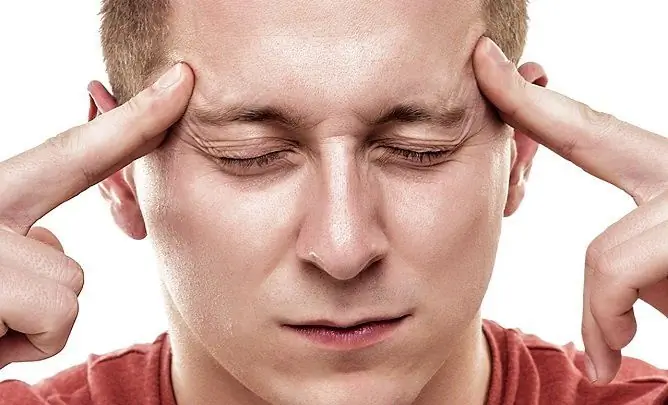- Author Rachel Wainwright wainwright@abchealthonline.com.
- Public 2023-12-15 07:39.
- Last modified 2025-11-02 20:14.
Causes of sinusitis: psychosomatics, psychological causes, prevention
The content of the article:
- Physiological causes of sinusitis
- Psychological causes of sinusitis
- Treatment and prevention
- Video
Sinusitis is a complex inflammatory process of the mucous membrane of the maxillary sinuses, accompanied by the accumulation of mucus and pus in the sinus cavity.

The cause of inflammation of the mucous membrane of the maxillary sinuses is both physical and psychological problems.
The main symptoms of sinusitis are:
- Difficulty nasal breathing;
- pressing pain in the region of the nose, eye sockets, cheeks, forehead, aggravated by tilting or turning the head;
- increased body temperature, chills;
- mucous or mucopurulent discharge from the nose;
- headaches and throbbing in the temporal region;
- changing the timbre of the voice;
- general weakness, fatigue.
The causes of sinusitis can be divided into physiological and psychological.
Physiological causes of sinusitis
The physiological causes of inflammation in the maxillary sinus include viruses and infections that enter with inhaled air or through the bloodstream from chronic foci.

Viruses are one of the causes of sinusitis.
Also, an important role in the development of the disease is played by:
- reduced immunity;
- curvature of the nasal septum;
- congenital narrowness of the nasal passages;
- the presence of polyps and cysts in the nose;
- chronic rhinitis;
- concomitant chronic diseases;
- the presence of carious teeth;
- traumatic injuries of the upper jaw.
Psychological causes of sinusitis
Numerous observations show that the psychosomatic state and the manifestation of the emotional experiences of the individual are directly related to the health of the organs and systems of the body.
Psychosomatics of sinusitis is a concept that unites psychological factors that contribute to the development of this disease.
Emotional stress, internal conflicts and fears can negatively affect the state of the body and lead to the emergence of acute and chronic diseases.
Any psychological shock can trigger the development of sinusitis. Metaphysical problems of the disease are considered as an internal imbalance that occurs in the body with the accumulation of negative emotions:
- anger;
- resentment;
- disappointment;
- self-pity;
- a feeling of not being in demand.
Possible psychological causes of sinusitis are:
- regular anxiety-depressive states;
- low self-esteem;
- overestimation of requirements for oneself;
- hypertrophied sense of responsibility;
- emotional upheaval;
- loss of mental self-control;
- lack of support;
- the problem of the difficulty of choosing something;
- chronic malaise and fatigue.
Restraining and controlling your emotions without the possibility of coming out in the form of tears, any actions, deeds, the inability to share, speak out to someone leads to an even greater accumulation of negativity. Thus, psychological stress begins to work against a person, which causes stress, depression, general weakness against the background of chronic fatigue. This contributes to the accumulation of internal somatic problems.

Fatigue and chronic malaise can lead to the development of various diseases, including sinusitis.
The occurrence of sinusitis in children may be associated with their need for parental attention or, conversely, in the wrong distribution of excess love for the child, which leads to emotional stress.
If the psychological state is violated, serious breathing problems can begin: not only inflammation of the maxillary sinuses, but also many other pathologies of the ENT organs.
Inside the maxillary cavity, a liquid with viscous mucus accumulates, and the outflow of the contents becomes difficult. Severe inflammation and edema appear, which creates conditions for the attachment and active reproduction of bacteria with the formation of pus inside the sinus. In this way, the body makes it known that it is necessary to change not only the attitude towards others, but also towards oneself. In addition, friends and relatives of the patient should also reconsider their views and attitudes towards him.
Louise Hay is one of the few researchers who first began to talk about how a person's psychological state directly or indirectly affects his health. According to the table of diseases and factors contributing to their development, compiled by Hay, possible causes of sinusitis can be:
- emotions held back for a long time;
- too low self-esteem;
- lack of confidence in their own abilities;
- resentment and rancor.
Closure within oneself leads to a violation of nasal breathing, as a result of which an inflammatory process begins with the onset of an acute or chronic disease. Not all modern doctors share such theories, but emotional stress actually leads to a weakening of the immune system, as a result of which favorable conditions are created for the active reproduction of bacteria that have entered the upper respiratory tract.
According to the French researcher Gilbert Renaud, sinusitis and other sinusitis can be caused by psychosomatic factors:
- inability to collect old debt and get what belongs to a person;
- a strong desire of a woman to have a child in the absence of such a desire in a man;
- frequent manifestations of self-pity and guilt towards others.
The presence of a large number of human complexes and chronic conflicts that affect the mental and, accordingly, the physiological state, can lead to chronic inflammation in the maxillary sinuses.
Despite psychological difficulties, a person does not always seek to visit a psychotherapist and find answers to the question - why? If it is not possible to consult a specialist, it is recommended to use the technique proposed by Liz Burbo. It consists in the fact that you need to list in free form as fully as possible or describe on a piece of paper everything that has accumulated - emotional experiences, thoughts, resentments, etc.
Sometimes it is quite difficult to be aware of your desires and, in particular, the need for recovery. For example, when you need to stand out, to draw attention to yourself, or when you constantly feel sorry for yourself. As a result, a mental block is imposed on protection from the disease, and the inflammatory process continues to develop. At the same time, the desire to achieve success in work or study while curing the disease can have a positive effect on the psychological state.
On the other hand, isolation and internal complexes can interfere, giving rise to the fear that, with a successful outcome and progress in business, friends and colleagues will envy him, which prevents or slows down the healing process. In such situations, it is necessary to deal with subconscious phobias.
Treatment and prevention
Given the psychological causes of sinusitis in adults, following some guidelines may increase the chances of recovery:
- do not restrain emotions and feelings;
- steadfastly accept life's difficulties;
- do not accumulate anger and resentment;
- accept others as they are;
- look for positive aspects even in the most negative circumstances;
- learn to evaluate events from a different angle;
- seek help from a qualified psychologist if it is impossible to independently control your emotions.
The search for and solution of psychosomatic causes of sinusitis is an addition to the main treatment, so do not forget that the disease has specific physiological causes and a medical solution.
Therapy includes broad-spectrum antibiotics, vasoconstrictor drugs. In more difficult cases, a puncture or washing of the maxillary sinuses is performed. It is important to consult an otorhinolaryngologist in a timely manner to diagnose and prescribe adequate treatment. If the doctor's recommendations are followed, the prognosis is favorable.
Video
We offer for viewing a video on the topic of the article.

Alina Ervasova Obstetrician-gynecologist, consultant About the author
Education: First Moscow State Medical University. THEM. Sechenov.
Work experience: 4 years of work in private practice.
Found a mistake in the text? Select it and press Ctrl + Enter.






